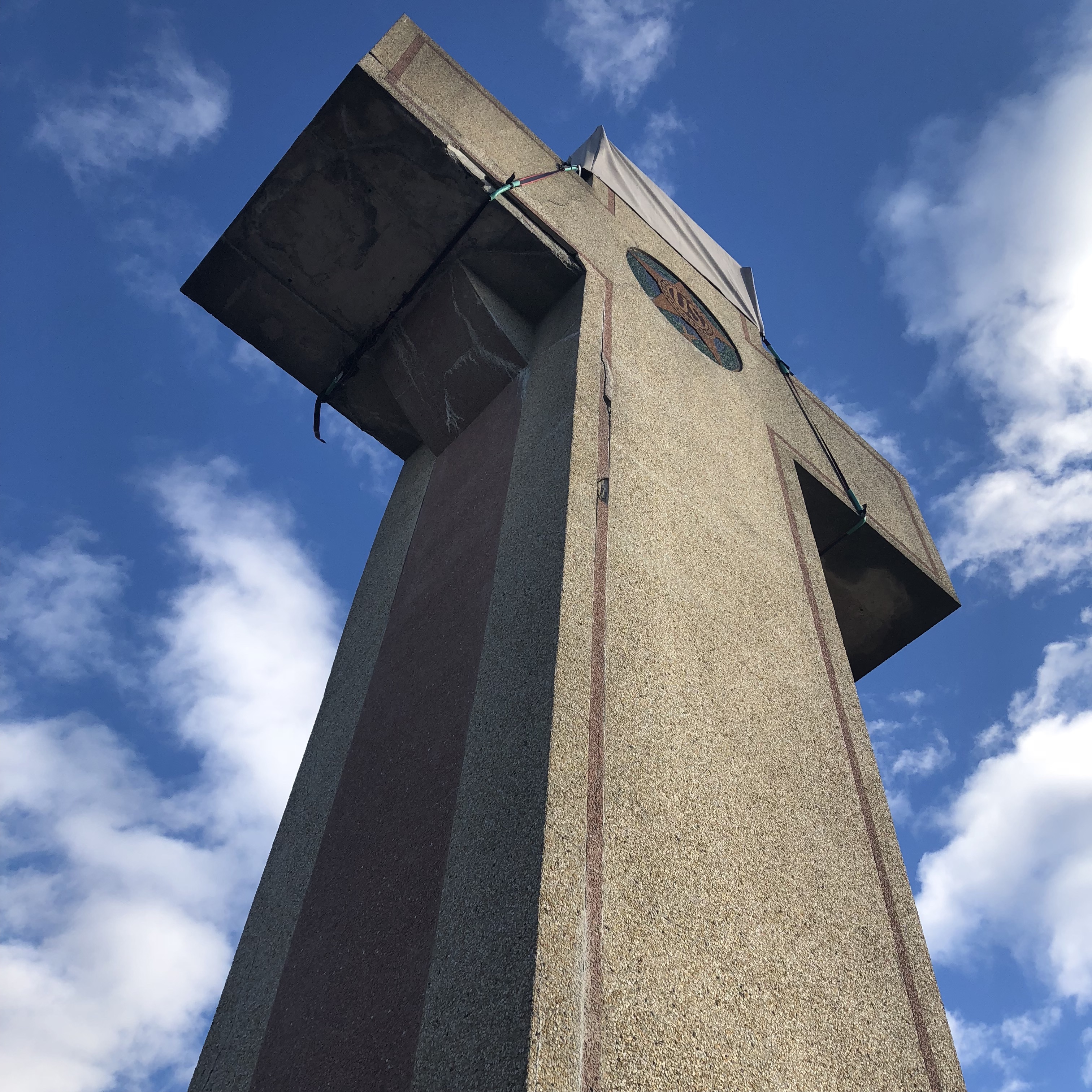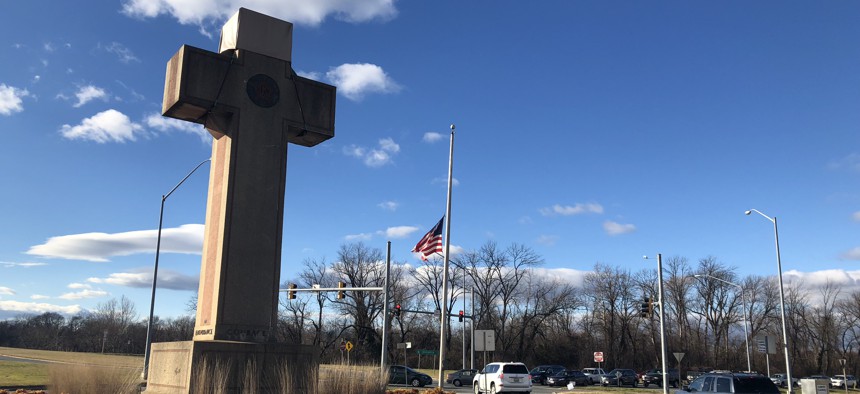Connecting state and local government leaders
States and localities argue the U.S. Supreme Court should use the case of the 40-foot cross to provide “clear guidance” on war memorials that use religious motifs.
BLADENSBURG, Md. — The U.S. Supreme Court will once again revisit the thorny issues of church and state separation this year while deciding the fate of a giant concrete and granite cross sitting on a small traffic island at a busy intersection a few miles outside Washington, D.C.
The 40-foot-high “Peace Cross,” erected in 1925 to honor 49 men killed in World War I, is maintained by a local agency, the Maryland-National Capital Park and Planning Commission. An appellate court panel more than a year ago found the monument, which has required $117,000 in upkeep over five decades and $100,000 set aside for renovations, “has the primary effect of endorsing religion and excessively entangles the government in religion.”
“One simply cannot ignore the fact that for thousands of years the Latin cross has represented Christianity. Even in the memorial context, a Latin cross serves not simply as a generic symbol of death, but rather a Christian symbol of the death of Jesus Christ,” wrote Judge Stephanie Thacker in the 2-1 decision.
Now the commission, along with the American Legion, which helped raise money for the cross after the First World War ended, is asking the Supreme Court to overturn and conclude that, despite its shape, the monument has a largely secular purpose of honoring veterans of the long-ago conflict. Other states and advocates for local governments have also weighed in, saying the case has implications not only for this one memorial, but potentially hundreds of other monuments scattered across the country.
In a brief for 30 state attorneys general, Lindsay See, the solicitor general for West Virginia, urges the justices to use this case, which they will hear on Feb. 27, to issue “clear guidance” about these kind of war memorials that use religious motifs and find they can be constitutional under the First Amendment’s ban on government promoting a particular religious faith. The National League of Cities and the National Association of Counties, along with other organizations, agreed in another brief, saying the line of previous Supreme Court decisions that lower-court judges use to decide whether a particular monument passes constitutional muster has created confusion about what is permissible under the First Amendment’s Establishment Clause and what isn’t.
“The need is great: Establishment Clause litigation is often very burdensome and costly, and drawn-out legal contests often create occasions for the very sort of religious strife and rancor that the First Amendment was designed to prevent,” wrote the attorneys representing the local government groups.
But Richard B. Katskee, the legal director of Americans United for Separation of Church and State, said this characterization of the legal landscape isn’t accurate. The standards laid out in previous court decisions are useful to municipalities and other governments, but sometimes officials just don’t like the answers they get about a particular problem they are confronting, he said.
“The Religion Clauses of the First Amendment respect the religious beliefs and practices of everyone. That’s the whole point of them,” Katskee said. “When a governmental entity takes sides and shows religious favoritism for some over others, whether with a huge lighted cross towering over the town or otherwise, it excludes some people—says, ‘you aren’t one of us; you don’t belong’ based on religion.”
From a Traffic Island to the High Court
The cross was born out of a movement by mothers of men killed in the war to honor their loved ones. They started a fundraising campaign, breaking ground in 1919 on the project along with a new road meant to connect Annapolis and Washington, The Washington Post reported.
The initial donors were asked to sign a pledge that said they “trust[ed] in God, the Supreme Ruler of the universe,” according to the American Humanist Association, which filed the lawsuit about the cross.
When that fundraising faltered, the American Legion took up the project. The cross, adorned with a plaque at the foot of the statue that names the 49 men it is honoring, was dedicated in 1925.

Since then, other war memorials have been erected on patches of grass along the maze of streets at this intersection, including a monument 200 feet away on another traffic median to the 1814 Battle of Bladensburg (which was part of the War of 1812 against Britain that actually lasted almost three years). None of the other memorials use religious imagery—and none grabs the attention of passerby like the imposing Peace Cross, which is also illuminated at night.
Although the traffic area is not one where people would be inclined to stop to visit the monuments on their own, the cross and other memorials are typically the site of Memorial Day and other community events. A group of Maryland and Prince George’s County officials called the cross “an important public landmark that is central to the civic life of Bladensburg” and the county.
“The events held at the memorial are not in any way partisan or sectarian but are instead an opportunity for the entire community to come together to celebrate or to mourn,” the officials argued in their brief.
The planning commission took over maintenance of the cross in 1960, which officials said was necessary to maintain traffic safety.
The Humanist Association, representing three local residents, filed its lawsuit in 2014, arguing the cross on public land represented a promotion of Christianity.
Broader Impact?
U.S. District Court Judge Deborah Chasanow upheld the cross in 2015 as a largely secular monument, focusing in part on a 2005 Supreme Court decision that allowed for a Ten Commandments statue to remain on the Texas State Capitol grounds. Reflecting on one of the concurring opinions in that case, Chasanow noted the cross’ “location among the other monuments of Veterans Memorial Park underscores its secular and commemorative nature.”
Chasanow also found the cross didn’t violate the high court’s Lemon v. Kurtzman ruling that set up a three-pronged test to evaluate if a certain practice or monument violates the Establishment Clause.

But a split panel of the U.S. 4th Circuit Court of Appeals took a different view, primarily examining the case under the Lemon test, which weighs whether something has in part a “secular purpose,” if its “primary effect” is to advance or inhibit religion, and if it involves “excessive entanglement” of government with religion.
In briefs, supporters of the monuments note the historic use of crosses in monuments to remember soldiers who died in World War I, saying they reflect back to the cemeteries in Europe where the fallen are buried in what are now fields of crosses.
Lisa Soronen, executive director of the State and Local Legal Center, which filed the brief on behalf of the local government organizations, said the court will surely consider the historic context of when this cross was built and what it represents.
“Anyone would think a local government putting up a cross or being involved in putting up a cross of that size at this point in time of history, it borders on laughable. This came up in a different time period, so I think the court will be sensitive to that,” she said.
But others say the reference to the American cemeteries for the war dead in Europe emphasized by many supporters is incomplete, noting that among those crosses are Stars of David for Jewish soldiers. And Katskee said that the Bladensburg cross was later rededicated to all veterans, which is more problematic.
“Rather than continue to waste taxpayer dollars repairing an exclusively Christian symbol, the government should use that money to construct a new memorial atop the historic platform that will honor all war veterans,” Roy Speckhardt, executive director of the American Humanist Association, said in a news release after the Supreme Court accepted the case.
Exactly what the impact would be if the court upheld the 4th circuit is unclear, although the brief for the 30 states said that there are many war memorials, particularly for World War I, that use crosses. There are two such memorials at Arlington Cemetery.

In a brief for Taos, New Mexico, attorneys David C. McDonald and R. Timothy McCrum wrote that a lawsuit has been threatened against the mountain community, which has a war memorial in the town plaza to the men who fought in the Second World War, including some killed during the Bataan Death March. The memorial, put up in 1960, features a bronze cross.
Katskee, though, said the impact might not be as big as some are suggesting. When his group digs deeper into some monuments, they have found they are on private land, which means there isn’t a conflict about government support of religion.
Law school professors Walter Dellinger and Martin Lederman offered their own suggestion to the court about the Bladensburg cross, saying that there is nothing about this case that should prompt the Supreme Court to revisit its prior rulings on the Establishment Clause. They argued that the cross could be maintained by a government entity if it is seen not as a broad war memorial, but one to the 49 named veterans.
In a September article, The Washington Post examined what could be discovered about the men, who included a 16-year-old private from a nearby town who fought in an African-American unit and a surgeon and medical school professor at Georgetown University. The paper found no evidence that any weren’t Christian.
Dellinger and Lederman wrote that the justices should reject an argument by the commission that maintains the cross that it is alright for a cross to represent the larger community. But it can represent this group of 49 people, who were likely to be Christians.
“On this record, it would appear to be reasonable to view the Peace Cross not as religious expression of the state itself, let alone governmental ratification of the messages of the cross, but instead as a respectful representation of a fact about the religion of those being honored,” they wrote.
Laura Maggi is the Managing Editor for Route Fifty and is based in Washington, D.C.
NEXT STORY: How States Responded to the Loss of 911 and Other Services




